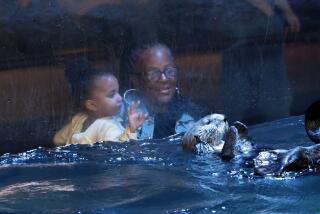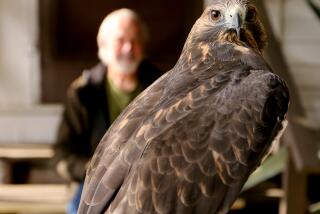The enduring call of the wild
- Share via
I thought about Tilikum the killer whale when I gave Lola the puppy a bath on Sunday.
It wasn’t the sight of my little dog covered in suds that reminded me of the giant orca, now quarantined at SeaWorld Orlando for killing a trainer. It was watching Lola’s post-bath routine, when I lifted her from the tub:
She ran wildly around the house, rubbing against the carpet and couches. Then she dashed out the door to the frontyard, where she rolled around on the lawn until she smelled more like dirt than lavender-scented conditioner.
The rubbing-and-rolling is a ritual followed by every dog that I’ve ever treated to a bath -- from our giant pit bull mix to this tiny Lhasa-poodle, and all the rescued strays in between.
Common sense tells me it’s a vestige of the ties between canis lupus familiaris and the less familial canis lupus -- wolves; some ancestral link to the wild, where smelling good could be a death sentence in a world of stinky predators.
We pamper our dogs as much as our kids, and still they respond to primal impulses with survival skills they haven’t needed for thousands of years.
And we expect a killer whale born at sea not to kill?
Several theories have been suggested to explain Tilikum’s violence. Was it roughhousing that went awry, or an explosion of pent-up rage at being confined?
The truth is unknowable, but this much is clear: It is arrogant and dangerous to believe that with information, training and treats, we can master the nature of a wild beast.
In fact, those enticements haven’t been enough to manage the wild side of my own tame beasts -- to get my dogs to stop chasing squirrels, burying bones in my flower beds and urinating on every tree . . . or the feet of gardeners and meter readers.
But that’s why my animals fascinate me.
Living with dogs keeps me connected to nature in a way that watching a killer whale splash in a tank never could. Their drives, fears and desires are as pure as their loyalty and love.
Dogs have been bred for specific tasks, so their temperaments and tendencies can be channeled. But they cannot be undone. We ought to learn to appreciate that rather than try to humanize them and bend them to our will.
That’s where we often let them down. Like Michael Vick, turning protective, proud pit bulls into the human equivalent of street thugs. And celebrities who use their pooches as status symbols, carrying them around in purses, dressed up in vests and shoes and bows.
Instead of shaping our dogs’ lives to fit our needs, we ought to take our cues from their quest for serenity.
Lola is sleeping, as I write this -- under my desk, shielded from whatever predators her inner wild dog expects. She has half-chewed bones hidden all over the house -- wedged inside slippers, buried in piles of laundry and tucked into the seam of her bed -- so imaginary scavengers won’t find her stash.
And at night, she slips into the den of my closet, curls up next to my shoes and settles into her bed.
The debate is raging now over what to do about Tilikum and other orcas like him -- whether amusement park shows are educational outlets or too cruel and unnatural to go on.
There is a parallel, though more nuanced, debate going on over how we treat our cats and dogs.
Too many would-be pets are put to death in animal shelters or left to roam and die on city streets.
Spaying and neutering ought to be pushed, even required, to stem overpopulation. And it’s encouraging that pet shops are finally, and rightfully, being held accountable for encouraging “puppy mills” -- mercenary breeders who supply unhealthy and ill-tempered dogs.
But that doesn’t mean that shelters and rescue groups ought to be our only options. There is a role for responsible breeders and joy in watching dogs do what they’re bred to do.
Not everybody is up for the demands and unknowns of the stray or rescue, and there are good reasons to be picky when you’re choosing a lifetime companion.
I chose Lola because I know my family’s limitations: kids with allergies and busy schedules, a mother long on love but short of patience.
And, like every dog we have had, watching her -- and letting her be -- is a joy, and an education.
I love her not only because of that hokum about unconditional love, but because Lola, like Tilikum, reminds me that in pull of nature versus nurture, nature often prevails.


